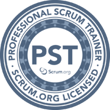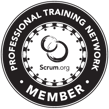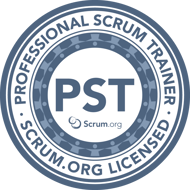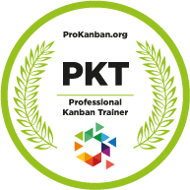Learning Objectives
Following the PSM-A course, you'll have learned how to perform the following:
- Effectively position and apply the following stances of a Scrum Master when serving Development Teams, Product Owners and organizations:
-
- The Scrum Master as a Teacher.
- The Scrum Master as a Coach & Mentor.
- The Scrum Master as a Facilitator.
- The Scrum Master as a Change Agent.
- Describe skills that can help make a successful Scrum Master.
- Explain how Scrum principles and values can help guide Scrum Masters in their decision-making.
- Support and enable Development Teams and Product Owners to become more effective.
- Provide tips and techniques for Scrum Masters to engage organizations in support of their Scrum Teams.
- Act as a servant-leader and continuously improve in this role.
- Facilitate organizational change and cultivate environments for agility to thrive.
Topics
The PSM-A course is a mix of lecture, case studies and interactive exercises as you collaborate with other students:
- Stances and Traits of Scrum Masters
- Impact of a Successful Scrum Master.
- Misunderstood Stances and Traits.
- Preferred Stances and Traits.
- Applying Scrum Principles and Values.
- Servant Leadership.
- Dealing with Team Conflict.
- Removing Impediments.
- Serving Development Teams
- Characteristics of Successful Development Teams.
- Facilitation Techniques.
- How "Done" Is an Increment?
- Sprint Goals for Transparency, Inspection and Adaptation of Sprints.
- Serving Product Owners
- The Role of Management in Scrum.
- Successful Product Delivery.
- How to Support the Product Owner.
- How Not to Support the Product Owner.
- Serving Organizations
- Understanding the Challenges of Middle Management.
- Measurement in Scrum.
- The Scrum Master as a Change Agent.
Scrum.org Certification
After completing a Professional Scrum Master-Advanced (PSM-A) class, you'll receive credentials to attempt the Professional Scrum Master II (PSM II) assessment and earn the industry-recognized PSM II Certification. These credentials never expire, however should you attempt the PSM II assessment within 14 days after receiving your credentials and not receive a passing score, you'll be granted a 2nd attempt for no additional fee.
Earning your PSM II Certification will make you part of an elite community of 40,000 PSM II badge holders from around the globe and unlike other Scrum training and certification organizations, your certification will never expire nor require future renewal fees.
Public and Private Training
Please visit our public training schedule to find our upcoming public PSM-A classes.
Interested in private on-site or Live Virtual Training? If so, private classes are available with group discounts! Please contact us at training@madisonhenry.com or 844.BE.AGILE so we can discuss your needs.
PMI PDU Credits
Students of Scrum.org courses are able to claim Project Management Institute (PMI) PDU credit: 14 PDUs. Please note that PMI PDUs are earned for course attendance and not for earning a Scrum.org certification. Students can claim PDUs under PMI’s "Education courses provided by other third party providers” category. You can claim your PDUs here.
About Scrum.org
Scrum.org is the home of Scrum, leading the evolution and maturity of Scrum to improve the profession of software development.
In addition to defining industry-leading Scrum training for practitioners at all levels, Scrum.org provides all of the tools and resources needed by Scrum practitioners to deliver value using Scrum. It hosts the Scrum Guide in 30 languages, provides assessments to allow people to evaluate themselves and improve and hosts community blogs, forums and resources to foster discussion and knowledge transfer.
Why Train with Scrum.org?
-
Scrum Leadership – Scrum.org is led by the co-creator of Scrum, Ken Schwaber.
-
Scrum Guide Alignment – Scrum.org's training is aligned with the Scrum Guide that is published and maintained by Scrum co-creators Ken Schwaber and Jeff Sutherland.
-
Consistent Quality – Scrum.org has developed and regularly enhances 1 body of content for each of its courses in collaboration with Scrum.org's 300+ global Professional Scrum Trainer to help ensure consistency and high quality. Scrum.org's approach of integrating lectures with team-based case studies and interactive exercises helps enable a great learning experience and preparation to begin effectively applying Scrum.
-
Meaningful Certifications – Scrum.org's Assessment & Certification Program includes rigorous assessments with the opportunity to examine your knowledge of Scrum, earn highly respected certifications and be recognized on Scrum.org. And unlike other Scrum training and certification organizations, your certification will never expire nor require future renewal fees.examine your knowledge of Scrum, earn highly respected certifications and be recognized on Scrum.org.
About Madison Henry 

The Madison Henry Group helps clients realize the benefits of agile software development and pursue organizational agility.
Founded in 2005, Madison Henry enables high performance and optimizes the value delivered by complex software through three lines of professional services: Agile Transformation with coaching and consulting across the enterprise; Training & Certification in partnership with industry leaders such as Scrum.org, Kanban University and Scaled Agile (SAFe); and Staff Augmentation for the key roles of Scrum Masters, Scrum Developers and Kanban Delivery Managers.
We are passionate about our work. We value insight, commitment and innovation. We maintain an unwavering pledge to client success and satisfaction.







